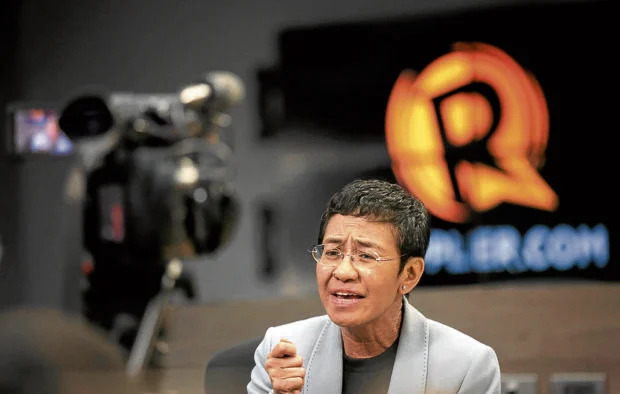When journalist and Rappler co-founder Maria Ressa was awarded the Nobel Prize for Peace last week—effectively the first Filipino to receive it— one of the loudest voices against it was acclaimed writer F. Sionil Jose.
A day after the announcement, the Ramon Magsaysay Memorial Awardee —lest we forget—took to Facebook saying, “Maria Ressa does not deserve the Nobel.” In the post, he insisted that the Philippine press is “alive and well not because of Maria Ressa.” The Nobel Committee, in awarding her alongside a Russian journalist, cited “their efforts to safeguard freedom of expression, which is a precondition for democracy and lasting peace.”
The Philippine press is ‘alive and well’
Jose, 96, a well-publicized contender for the Nobel Prize for Literature for years now, went on to defend his claim about the well-being of press freedom in the country:
“No writer is in jail. There is no censorship. Duterte hasn’t closed a single newspaper or radio station.” ABS-CBN’s closure, he said, was a decision made by the Congress, although he did acknowledge that President Rodrigo Duterte “influenced” it. “The real issue against ABS-CBN as I have pointed out is not press freedom but money, politics, power, and its abuse by the Lopezes who own the TV network.”
[READ: What does press freedom have to do with their franchise issue? ABS-CBN answers]
“Sure, journalists have been killed in the Duterte regime just as it was in past administrations. But those killings cannot be laid at Duterte’s door,” he added. He claimed that the killings are usually ordered by minor politicians or officials attacked by journalists.
[READ: How the Philippine media was threatened over the years]
He ended his statement by mentioning “great journalists who fought Marcos” during the dictatorship and subsequent censorship. His roster included the late Philippine Daily Inquirer editor Letty Jimenez-Magsanoc, journalist Sheila Coronel, and broadcaster Cheche Lazaro.
The media quickly picked up Jose’s controversial statement, and so did Malacañang. Presidential spokesperson Harry Roque, reacting to the National Union of Journalists of the Philippines’s statement about media censorship in the country, said, “We regard F. Sionil Jose’s opinion as the better view of the state of the press freedom in the country.”

Two days after Jose’s first Ressa tirade, he posted on Facebook again, this time urging critics to ask themselves: “What heroic sacrifice has Maria Ressa done for freedom and the Philippines, and who is funding her?”
It can be recalled that in 2018, the Securities and Exchange Commission (SEC) moved to shut down Ressa’s news website, which has been critical of the Duterte administration. SEC accused the group behind the site of violating constitutional restrictions on mass media ownership. This came after it was found that the news outlet received funding from Omidyar Network, a U.S.-based philanthropic investment firm.
[READ: Rappler’s cautionary tale: First, they came for the journalists. Next, they could come for you]
In the same post, Jose denied siding with President Duterte, saying he’s also been critical of the administration. While the writer has called Duterte’s “accommodation” of the Marcos dictatorship a “major failing,” he hailed the president’s win in 2016 as a “revolution,” with the expectation that Duterte would bring “meaningful change.”
Not envious
The latest in his series of takedowns of Ressa is a clarification that he, in fact, is “not envious of Maria Ressa getting the Nobel.”
“It is for Peace, not Literature. Of course, I wanted it very much,” he went on. He said that as he grew older, he realized he was up against the world’s best, including one of his literary idols, the controversial American novelist Norman Mailer. “When he died without getting the Nobel, I stopped dreaming about it knowing I will not get it. If by some miracle I’ll get it next year, the salute, at my age is meaningless. It is enough that I was nominated. But a million dollars, I can do a lot with it!”
This year, Tanzanian novelist Abdulrazak Gurnah was awarded the 2021 Nobel Prize for Literature. He is only one of a few people of color to win the award. At 72, Gurnah is the first Black writer to receive the prize since American novelist Toni Morrison in 1993.
Jose is widely known in literary circles as a contender for the Nobel Prize for Literature. By some estimates, his odds of winning are 50-1, the same odds as American novelist Don DeLillo and Norwegian author Karl Ove Knausgaard.
The National Commission for Culture and the Arts (NCCA), which conferred him the National Artist Award for Literature in 2001, says his body of work consistently espouses “the aspirations of the Filipino—for national sovereignty and social justice.”
His masterpieces, the five-novel Rosales saga, “captures the sweep of Philippine history while simultaneously narrating the lives of generations of the Samsons whose personal lives intertwine with the social struggles of the nation,” says the NCCA.
His works have been translated into over 20 languages, indicating his works’ appeal to international readers.












































